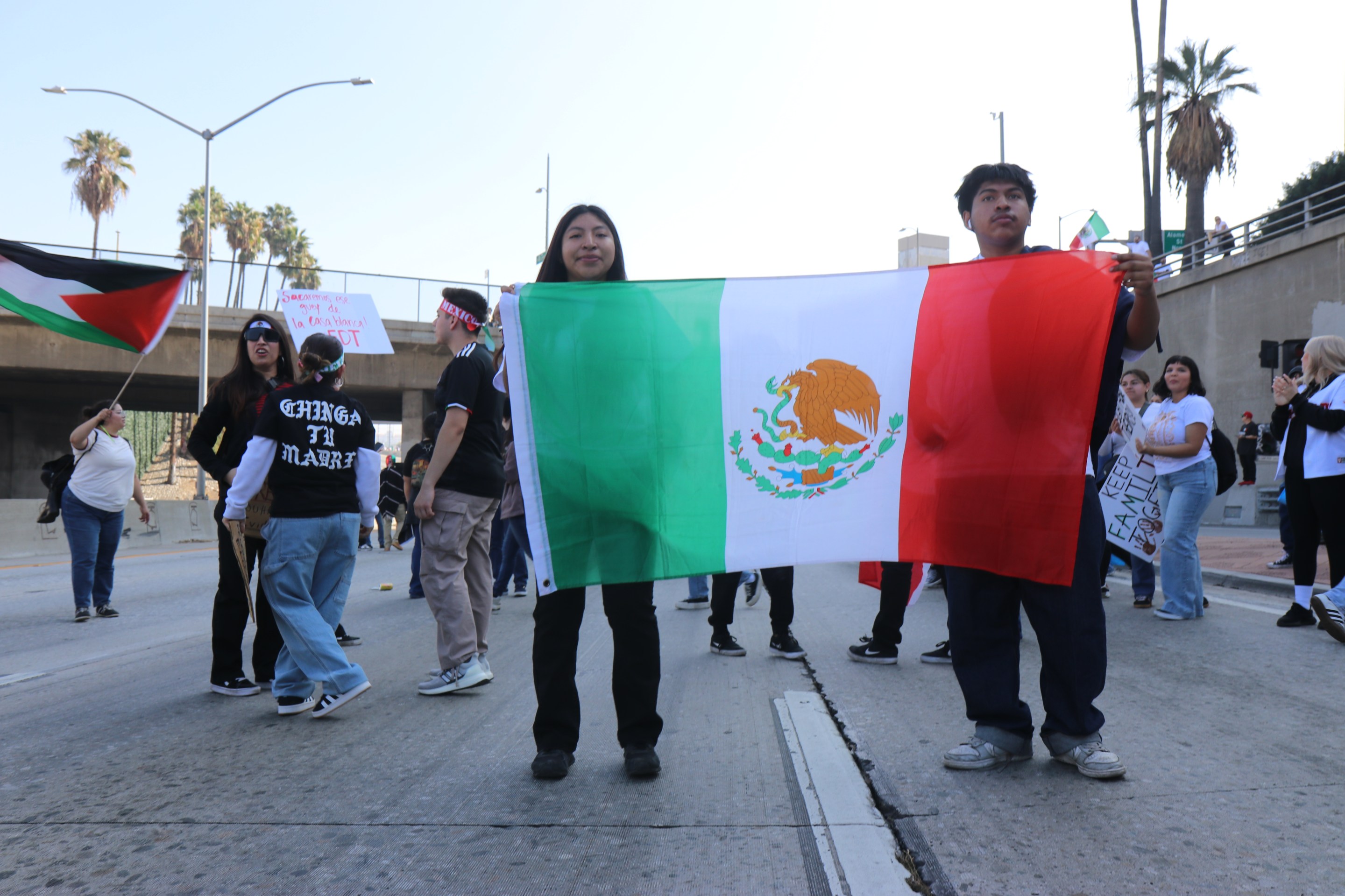A few weeks ago, a Mexican American woman was harassed by a man who demanded she "go back to Mexico” as she was shopping with her young son. The man didn’t care about her or her child, nor did he care about her immigration status or ethnic background. To him, she was just another Mexican—an outsider he felt entitled to berate, demean, and accuse of being the "enemy within." On February 8th, a teenager was stabbed in front of City Hall, and news platforms reported “non-American flags” being present while the victim was on the ground. In Bakersfield, around the same time, a female activist was arrested for replacing a U.S. flag with a Mexican flag.
In a society where our very existence is often disparaged, we have few tools to unite and fight against the persistent racism and xenophobia that permeate our daily lives. Waving flags—yes, Mexican flags—at protests is one such way to be seen and heard in a country that so often wishes Mexicans/Chicanos and Latinos would disappear.
Ironically, it seems that even President Trump would agree with this act of protest. After all, he has repeatedly defended the waving of the Confederate flag as an expression of free speech.
In a recent interview with Politico, Trump claimed, "I know people that like the Confederate flag, and they're not thinking about slavery. I just think it's freedom of speech, whether it's Confederate flags or Black Lives Matter or anything else you want to talk about. It’s freedom of speech."
This comparison is both jarring and historically inaccurate. The Confederate flag represents a treasonous rebellion against the United States, waged for the sole purpose of preserving slavery. The riots of January 6, 2021, continue to remind us that a part of the nation still holds many of the Confederacy's values as their current values.
Let’s be clear: The Confederacy was a breakaway government formed in 1861 by Southern states that committed treason against the United States by seceding and waging war to uphold their system of racial slavery.
Rooted in white supremacy, the Confederate states explicitly built their foundation on the enslavement and subjugation of Black people. This was not hidden or implied—it was openly stated by Confederate Vice President Alexander Stephens in his infamous "Cornerstone Speech," where he declared that the Confederacy’s government was based on "the great truth that the negro is not equal to the white man."
By rebelling against the U.S. to defend human bondage, the Confederacy not only sought to dismantle the Union but also to enshrine an economy and society built on racial exploitation and oppression.
So, if waving a Confederate flag—a symbol of treason and racial subjugation—is considered "freedom of speech," why should the Mexican flag be seen as a threat to American identity?
The roots of racial animosity between Anglos and Mexicans run deep. Even before the U.S.-Mexico War of 1846-48, anti-Mexican sentiment was already entrenched, leading to violent confrontations, dispossession, and the systematic loss of rights—consequences that endured for over a century. In a country where rational thought is often overshadowed by political posturing, and where belonging is questioned based on skin color and ethnic heritage, how do marginalized communities assert their presence?
Raising Mexican flags is not an act of anti-Americanism. Quite the opposite—it is an expression of cultural pride, dignity, and resistance in the face of racism and intolerance. In the United States, waving the Mexican flag—or any national flag—can be an act of defiance against oppression, a declaration of one’s humanity and rights in response to relentless denigration by movements like MAGA that seek to marginalize entire communities.
The Mexican flag is not a symbol of oppression, racial injustice, or white supremacy, like that of the Confederacy’s. On the contrary, for over two centuries, it has represented one of the foundational cultures that helped shape the United States. Yes, you heard that right—Mexican culture is an integral part of the American experience.
From language and history to politics, economic contributions, literature, food, music, dance, and art, Mexican and Chicano influences are woven into the very fabric of the United States. Like it or not, Mexican and Chicano culture isn’t going anywhere—it is embedded in the nation’s identity. No executive order can erase “Mexican.”
Attempts to suppress the Mexican flag will only create new symbols of resistance. And when that happens, it will only strengthen the resolve of people to expand their cultural horizons, unifying them even further in their fight for acknowledgment and respect.
So to those proudly waving the Mexican flag—and any other national flag—remember this: It’s all about free speech and the right to express your culture. And, according to Trump himself, it’s your God-given right.






